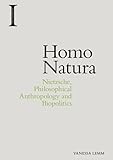Homo Natura : Nietzsche, Philosophical Anthropology and Biopolitics / Vanessa Lemm.
Material type: TextSeries: Incitements : INCIPublisher: Edinburgh : Edinburgh University Press, [2022]Copyright date: ©2020Description: 1 online resource (216 p.)Content type:
TextSeries: Incitements : INCIPublisher: Edinburgh : Edinburgh University Press, [2022]Copyright date: ©2020Description: 1 online resource (216 p.)Content type: - 9781474466714
- 9781474466738
- online - DeGruyter
| Item type | Current library | Call number | URL | Status | Notes | Barcode | |
|---|---|---|---|---|---|---|---|
 eBook
eBook
|
Biblioteca "Angelicum" Pont. Univ. S.Tommaso d'Aquino Nuvola online | online - DeGruyter (Browse shelf(Opens below)) | Online access | Not for loan (Accesso limitato) | Accesso per gli utenti autorizzati / Access for authorized users | (dgr)9781474466738 |
Frontmatter -- Contents -- Acknowledgements -- Abbreviations -- Introduction: Who Is Nietzsche’s Homo Natura? -- [1] Kantianism, Naturalism and Philosophical Anthropology -- [2] Humanism beyond Anthropocentrism -- [3] Psychoanalysis and the Deconstruction of Human Nature -- [4] Biopolitics, Sexuality, and Social Transformation -- Conclusion: Posthumanism and Community of Life -- Appendix -- References -- Index
restricted access online access with authorization star
http://purl.org/coar/access_right/c_16ec
Highlights the relevance of Nietzsche’s thinking about human nature for contemporary debates in biopolitics and posthumanismInnovatively engages Nietzsche’s philosophy with contemporary debates on philosophical anthropology, psychoanalysis, gender studies, biopolitics and posthumanismOffers a new reading of parrhesia (truth speaking): from the ancient cynics via Nietzsche’s idea of Redlichlkeit (honesty/probity), to Foucault’s recently published reading of parrhesia in Ancient Greek philosophyProvides a unique reading of Nietzsche’s view on women, gender and sexual differenceNietzsche coins the enigmatic term homo natura to capture his understanding of the human being as a creature of nature and tasks philosophy with the renaturalisation of humanity. Following Foucault’s critique of the human sciences, Vanessa Lemm discusses the reception of Nietzsche’s naturalism in philosophical anthropology, psychoanalysis and gender studies. Lemm offers an original reading of homo natura that brings back the ancient Greek idea of nature and sexuality as creative chaos and of the philosophical life as outspoken and embodied truth, perhaps best exemplified by the Cynics’ embrace of social and cultural transformation.
Mode of access: Internet via World Wide Web.
In English.
Description based on online resource; title from PDF title page (publisher's Web site, viewed 27. Jan 2023)


